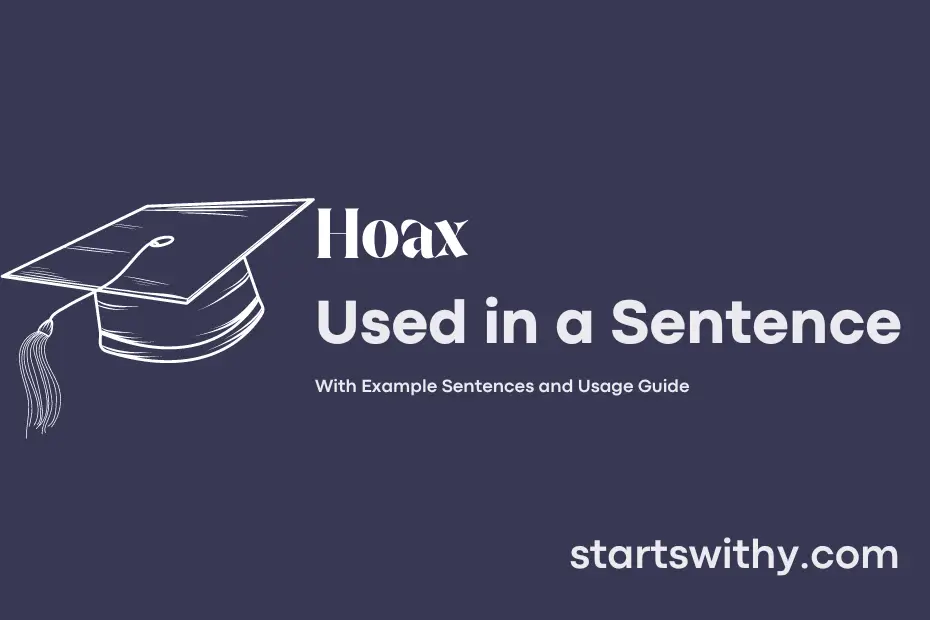Have you ever come across a story or piece of information that turned out to be completely false and misleading? This type of misleading information is known as a hoax.
A hoax is a deceptive or misleading act or fabrication created to intentionally mislead others. It is often spread through various mediums such as social media, news outlets, or word of mouth, causing confusion, panic, or harm. Hoaxes can be created for various reasons, including pranks, political agendas, or to gain attention or notoriety. Evaluating the credibility of information and being cautious of hoaxes is essential in today’s digital age filled with misinformation.
7 Examples Of Hoax Used In a Sentence For Kids
- Be careful of believing everything you hear, sometimes people lie and create a hoax.
- Hoax means someone is playing a trick to fool others.
- It is important to double-check information to make sure it is not a hoax.
- When you see something that seems too good to be true, it might be a hoax.
- Remember, it is not nice to make up a hoax to deceive others.
- Let’s always be honest and not create a hoax.
- If you hear about a hoax, tell a grown-up so they can help you understand.
14 Sentences with Hoax Examples
- Hoax messages about exam cancellations were circulating among college students last week.
- Many students were relieved to find out that the news of a campus closure was just a hoax.
- The rumor about free laptops being distributed by the university turned out to be a hoax.
- Students were warned to be cautious of emails asking for personal information as they could be part of a phishing hoax.
- The video claiming to contain leaked exam papers was a blatant hoax.
- A fake social media account pretending to be the college administration spread a hoax about fee hikes.
- Some students fell for the prank and believed the poster advertising a non-existent concert was real, only to realize it was a hoax.
- A hoax email warning about a nationwide strike disrupted class attendance on Friday.
- The announcement claiming that classes were canceled due to a power outage turned out to be a hoax.
- Several students were tricked by a fake news article reporting that the college was shutting down, but it was later revealed to be a hoax.
- A senior student confessed to starting a hoax Instagram account to see how quickly rumors would spread.
- The message circulating on WhatsApp claiming that the library will be closed for renovations was debunked as a hoax.
- The poster advertising a party at the student hostel was revealed to be a hoax created by a mischievous student.
- The announcement about a famous guest speaker visiting the college next week was confirmed to be a hoax.
How To Use Hoax in Sentences?
To use the word Hoax in a sentence, follow these simple steps:
-
Understanding the Meaning: Before using Hoax in a sentence, it’s important to understand its meaning. A Hoax is a misleading or deceitful act intended to deceive or trick someone.
-
Identify the Context: Think about a situation where someone is trying to deceive others or spread false information.
-
Formulating a Sentence: When you’re ready to use Hoax in a sentence, consider the following example: “The email claiming that the winner of the lottery was announced turned out to be a hoax.”
-
Check Grammar and Punctuation: Make sure your sentence is grammatically correct and the word Hoax is used appropriately in the context.
-
Practice: To become more comfortable using Hoax in sentences, try to incorporate it in different scenarios to enhance your vocabulary.
Remember, using new words like Hoax in sentences is a great way to expand your vocabulary and improve your communication skills. With practice and exposure, you will become more confident in incorporating Hoax in your writing and conversations.
Conclusion
In conclusion, the examples of sentences featuring the keyword “hoax” illustrate instances where false information or deceitful claims were propagated. These sentences highlight the prevalence of hoaxes in various contexts, such as social media, news reports, and public statements. They underscore the importance of critical thinking and verification of sources to avoid falling victim to deceptive information.
By examining these sentences, it becomes evident that hoaxes can have serious repercussions, including spreading misinformation, causing panic, and damaging reputations. It is crucial for individuals to be cautious and discerning when encountering information to prevent the proliferation of hoaxes and maintain the integrity of communication channels. Ultimately, being vigilant and questioning the validity of claims can help mitigate the impact of hoaxes and promote a more informed and reliable dissemination of information.



